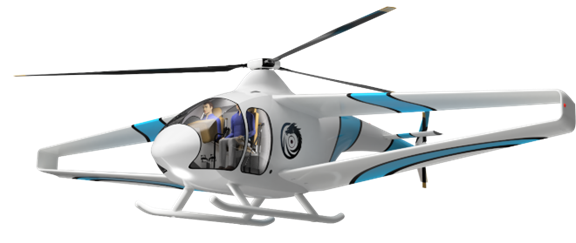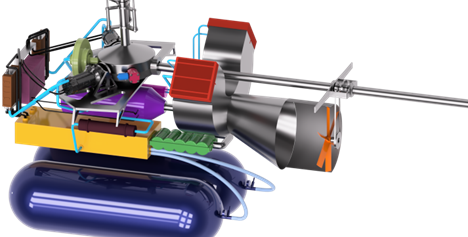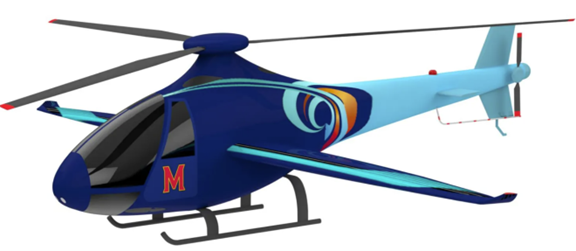 |
The annual Vertical Flight Society (VFS) Student Design Competition engages student teams to design a unique vertical takeoff and landing (eVTOL) aircraft based on sponsor criteria. The 2025 sponsor, Airbus, challenged participants to push boundaries to design a next-generation VTOL aircraft powered exclusively by hydrogen-based, electric propulsion.
University of Maryland (UMD) aerospace engineering students rose to the complex challenge, taking both category first-place prizes with their graduate team’s Wyvern and undergraduate team’s Draco designs. The competition included 20 entries from 16 universities across 10 countries and seven U.S. states. Representatives from both winning UMD teams will go on to present their designs at the VFS Forum 82, set for May 5–7, 2026, in West Palm Beach, Florida.
Teams were specifically tasked with using Proton Exchange Membrane Fuel Cells (PEMFC)–a type of specialty fuel cell for electric propulsion systems–and high-pressure hydrogen storage to power a two-seat rotorcraft (185 Kg payload) to maximize endurance and thereby demonstrate the feasibility of practical zero-emission vertical lift. The novel power source pushed students to think creatively about the future of clean and quiet air travel.
Led by Kumardip Basak, UMD’s graduate team included Apurva Anand, Brett B. Sweeny, Dogyu Jun, Hussien A. A. H. Hussien, Jacob C. McCallum, Radu Teodorescu, Remi J. Hensel, and William M. Ogle.
 |
| 2025 Graduate Design, Wyvern |
The graduate team’s winning design, Wyvern, is a 1,648 kg aircraft with a total flight time of five hours, requiring only 26 Kg of hydrogen. It was built from the ground up around the novel power source, featuring an unconventional box wing and an advanced variable-speed rotor to maximize the benefits of the electric drive. The team also designed the fuel cell from cell to system level and leveraged in-house research on power sharing with booster batteries to manage the unique power demands of VTOL. A composite airframe, elastomeric rotor hub, new airfoils, supercritical tail rotor driveshaft, battery-assisted autorotation, and honeycombed crash absorber for hydrogen tank safety were the key enablers and drivers of the design.
 |
| 2025 Graduate Design, Wyvern powerplant architecture |
Judges praised UMD’s Wyvern for its clear architecture down-selection, comprehensive trade studies, technically strong propulsion and hydrogen fuel cell integration, its unique box-wing, slowed-rotor configuration, inventive “floiler” system, strong safety features, and detailed subsystem that demonstrated a wide range of expertise.
Led by Samuel Renz, the undergraduate team included Joshua Katz, Colby Cotoia, Ron Berlin, Billy Lee, Ishmael Agui, and Isaiah Lee.
 |
| 2025 Undergraduate Design, Draco |
The undergrad team’s winning design, Draco, is a 1,417 kg aircraft with over 3.5 hours of flight time requiring about 14.2 kg of hydrogen. The fuel cell also leveraged in-house research on power-sharing to optimize the size of the PEMFC system. The main rotor is also three-bladed and variable speed, and the wing is much simpler, based on proven, production-ready technology. Draco uses a single-stage bevel transmission with two electric motors for simplicity and reliability.
Judges praised Draco for validating key performance in a well-organized fashion, attention to manufacturability, simplicity of pilot interface, and presenting a coherent design concept based on reasonable assumptions.
The teams were taught and mentored by Dr. V.T. Nagaraj and Distinguished Visiting Faculty Tomasz Krysinski, as well as other faculty members of the Alfred Gessow Rotorcraft Center.
“The VFS designs inspire students to work on problems that are envisioned by the rotorcraft industry to shape the future of vertical flight,” said Alfred Gessow Professor Anubhav Datta.
“The competition forces the students to implement classroom theory into real-world engineering practice,” added Distinguished University Professor Inder Chopra. “But most importantly, they learn to appreciate their individual strengths, along with the value of teamwork, effective leadership, and project management.”
Related Articles:
Seven UMD Students Receive 2025 Vertical Flight Foundation Scholarships
Logan Selph Awarded NSF Graduate Research Fellowship
Gebhardt Named 2025-26 MWC ARCS Scholar
Rudolph Awarded Women in Defense Scholarship
Joseph Mockler Awarded DoD SMART Scholarship
Aerospace Engineering Senior Earns Winston Family Award for Outstanding Thesis
Grant Duemmel Receives Outstanding Graduate Assistant Award
Dylan Hurlock Receives Wings Club Foundation Scholarship
Congratulations to our 2025 Department and College Honors and Award Recipients
Students Take Top Spots at AIAA Region III Student Conference
September 23, 2025
|

